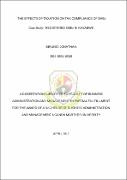| dc.description.abstract | This study was to establish the effects of taxation on tax compliance of SMEs: A case study selected SMEs in Kayabwe Town Council. The study aimed at establishing the effect of taxation on tax compliance of SMEs; finding the influence of tax education on compliance levels of tax payers, know the effect of tax administration on compliance levels of SMEs, the role of electronic tax on tax compliance of SMEs. The study was guided by the following research objectives; to evaluate the influence of tax education on compliance levels of tax payers in Kayabwe Town Council, to determine the level of effectiveness of revenue collection, to determine the role of electronic
The study applied both qualitative and quantitative research designs where interviews and Questionnaires were used. Data was collected from both primary and secondary sources. Data wasprocessed and analyzed using formal tables, pie charts, graphs, narrative text. A total of 50 respondents were considered out of the entire population in the selected SMEs in Kayabwe Town Council.Findings, the study focused on establishing the effectiveness of E-tax on voluntary tax compliance, since there methods that have been put in place and tax payers easily reach access them, E-tax has promoted voluntary tax compliance and thus while interviewing some of the respondents, many of them clear their bills on mobile money systems.Tax payers are given less attention by the tax authorities and thus do believe that more tax education was enable them understand more tax laws. The researcher also found out that selected SMEs in Kayabwe Town Council disagreedon the fact that tax administrators are aware of their market conditions, since large volumes of sales help generate more revenues as excises increase, despite tax-induced reduction in sales. Thus by the mere fact the tax administrators give tax payers less attention they are not aware of the market conditions.
In conclusion, therefore, when it comes to taxation of SMEs, high tax rates are the primary problem of entrepreneurs. Despite the fact that they face other tax related issues, it is the problem of high tax rate that mostly promotes non-compliance and pushes most SMEs to remain in the informal sector. Hence, SMEs are deprived of the benefits that arise if the government had enough tax revenue to embark on some development projects provision of amenities such as electricity and good roads which are tools that create an enabling environment for SMEs to thrive. | en_US |


